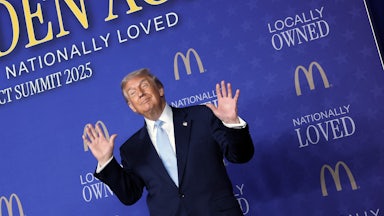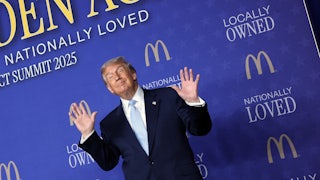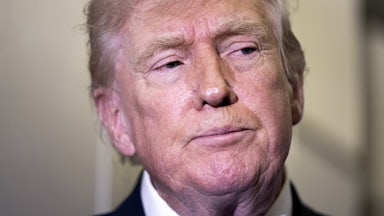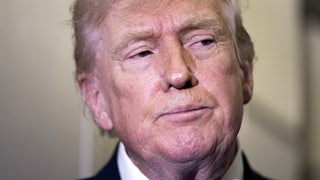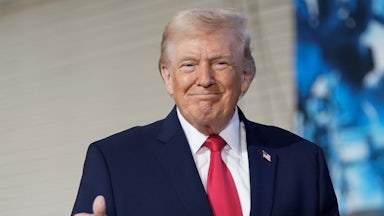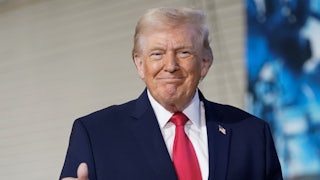As I write Thursday morning, the S&P 500 is down more than 4 percent. President Donald Trump’s Liberation Day liberated the stock market from nearly $3 trillion and me from $12,171 in my individual retirement account. We’re just getting started.
The drop will halt as the markets ponder whether Trump will relent and put his wealth-destroying tariffs on hold. If he doesn’t, the S&P 500 and my IRA will nose-dive again. There’s no telling how deep in the crapper we will all be when Trump finally cries uncle or, alternatively, when Congress intervenes to stop the downward spiral. If neither occurs, get ready for another Great Depression. Did I mention that Elon Musk’s Department of Government Efficiency drove March layoffs to their highest level since the Covid recession?
Politically, Trump’s tariff package represents a victory, of sorts, for Commerce Secretary Howard Lutnick and White House trade adviser Peter Navarro, Trump’s two most extreme trade hawks. The package represents a defeat for Trump’s semi-respectable treasury secretary, Scott Bessent, along with national economic adviser Kevin Hassett, who entered office under the delusion that they could keep Trump from wrecking the economy. If they don’t resign now in protest, what’s left of their reputations will go up in smoke. (Lutnick and Navarro are fortunate in that they have no reputations to rescue.)
The tariff plan consists of a 10 percent tariff on all imports, which will kick in on Saturday, followed by various “reciprocal” tariffs that go into effect on Wednesday. Trump’s idea of reciprocity is even more preposterous than we thought. Previously, Trump was going to designate as a trade barrier the value-added tax common throughout Western Europe, even though the VAT applies equally to imports and domestically manufactured goods. Instead, reciprocal tariffs are being calculated as the dollar amount of the U.S. trade deficit with any given country divided by the dollar amount of U.S. imports from that country. The financial journalist James Surowiecki figured this out immediately, and the White House later confirmed it, albeit with a more intimidatingly elaborate-looking formula that achieves the same end. (As Paul Krugman noted today, the administration’s fancy-looking formula is gussied up with Greek letters that functionally cancel each other out, in the same way a middle schooler might pad out a book report with five-dollar-word selections from a thesaurus.)
The biggest problem with Trump’s methodology is that it presumes that a U.S. trade deficit with Country X or Country Y is the result of unfair trade practices, which may or may not be the case. Country X or Country Y may simply be a developing economy.
The African nation of Lesotho, for example, where more than one-third of the population earns $2.15 a day, got hit with a 50 percent tariff for the sin of selling the United States too many diamonds and textiles. Lesotho is one of the places Trump designated a “shithole country” back in 2019, and last month he called it a place “nobody has ever heard of.” Also hit with a 50 percent tariff is Saint Pierre and Miquelon, a pair of French-territory islands south of Newfoundland that I genuinely had never heard of before today. These rapacious colonists have the temerity to sell us … fish, I think, and crustaceans of some sort. The tariff calculations are rigged further by excluding services, in which the U.S. enjoys a trade surplus globally.
The business press is trying, and failing, not to create a sense of panic. “If implemented as announced,” Bloomberg reports, “the new tariffs will increase the average US rate by triple the 5 percent change the Smoot-Hawley duties of 1930 did, pushing them above 20 percent.” Smoot-Hawley was, according to an official history by the U.S. Senate “among the most catastrophic acts in congressional history.” Did you hear that, Republican-controlled Senate?
The damage is entirely deliberate. Bloomberg reports that the Trump White House is saying the tariffs will “lead to a flurry of investment into US manufacturing and jobs, even if it means navigating a period of pain before that.” This stirs memories of reporter Peter Arnett’s famous quote from an unnamed Army major after the Battle of Bến Tre in 1968: “It became necessary to destroy the town to save it.”
Trump himself announced on Truth Social this morning that “THE OPERATION IS OVER! THE PATIENT LIVED, AND IS HEALING.” In fact, the patient is hemorrhaging, and the medieval barber behind the Resolute Desk recommends further bloodletting. I just checked my IRA again. I lost another $807 just while writing this story, which at the request of my editor I wrote really fast. Someone get this lunatic out of the operating room before he kills us all.

